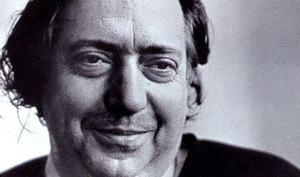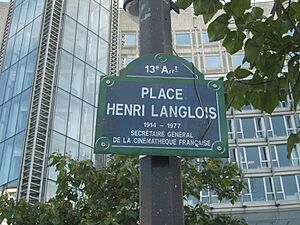Henri Langlois facts for kids
Quick facts for kids
Henri Langlois
|
|
|---|---|
 |
|
| Born | 13 November 1914 İzmir, Ottoman Empire (now Turkey)
|
| Died | 13 January 1977 (aged 62) Paris, France
|
| Occupation | Co-founder and director of the Cinémathèque Française |
| Known for | Film preservation, film archiving, film history, cinephilia |
| Partner(s) | Mary Meerson |
Henri Langlois (13 November 1914 – 13 January 1977) was a French person who loved and saved movies. He was a pioneer in film preservation, which means he worked hard to keep old films from being lost or destroyed. Langlois was a very important person in the history of cinema. His movie showings in Paris during the 1950s helped inspire the ideas behind the auteur theory. This theory suggests that a film's director is like the author of a book.
Langlois helped start the Cinémathèque Française with Georges Franju and Jean Mitry. This was a special place for showing and keeping films. He also helped create the International Federation of Film Archives (FIAF) in 1938. With Lotte Eisner, a chief archivist, he worked to save films and their history after World War II. Langlois was known for his unique ways, and sometimes caused arguments. But he also greatly influenced young movie lovers and critics who later became the French New Wave filmmakers.
In 1974, Langlois received a special Academy Honorary Award. This award honored his dedication to film art, his huge efforts in saving old movies, and his strong belief in the future of cinema.
Contents
Saving Films at the Cinémathèque Française
In 1936, Langlois, Franju, and Mitry opened the Cinémathèque Française in Paris. It was a movie theater and a museum. Their collection started with just ten films in 1936. By the early 1970s, it had grown to more than 60,000 films. Langlois was more than just someone who kept records. He saved many films that were in danger of disappearing forever.
Besides films, Langlois also helped save other movie-related items. These included old cameras, projection machines, costumes, and old theater programs. He collected so many things that he gave them to the Musée du Cinéma in 1972. This museum was located in the Palais de Chaillot. The collection was later moved after a fire in 1997.
During World War II, Langlois and his friends worked to protect many films. They saved them from being destroyed during the Nazi occupation of France.
Inspiring New Filmmakers
Langlois had a big influence on the directors of the French New Wave. These included François Truffaut, Jean-Luc Godard, Jacques Rivette, Claude Chabrol, and Alain Resnais. Many young filmmakers who followed them were also inspired by Langlois. Some of these filmmakers were called les enfants de la cinémathèque. This means "children of the cinémathèque." They were often seen in the front row of the crowded movie showings.
Langlois had a passionate way of looking at film. This was different from the more scientific approach used by others, like Ernest Lindgren in Britain. Langlois's methods were sometimes unusual. He was criticized for not having a clear system for keeping records. A part of the Cinémathèque's collection was lost in a fire on July 10, 1959.
Langlois's Removal and Return
In 1968, the French culture minister, André Malraux, tried to fire Langlois. This was because of Langlois's strong control of the museum. On February 7, the Cinémathèque board officially replaced Langlois. They said it was due to his poor management and how he stored the films.
But people around the world were very upset. Even the famous Cannes Film Festival was stopped in protest that year. Students in Paris also protested, including Daniel Cohn-Bendit. Famous directors like Alfred Hitchcock, Akira Kurosawa, and Federico Fellini sent messages of support.
After many strong debates, Malraux brought Langlois back on April 22. However, the museum's funding was reduced. This event, called the affaire Langlois, was seen as an early sign of the larger May 68 protests that happened later. Truffaut dedicated his 1968 film Stolen Kisses to Langlois. The movie even starts with a shot of the closed Cinémathèque.
Later Life and Legacy
In 1970, Langlois chose seventy films from the Cinémathèque's collection. These films were shown in an exhibition called "Cinémathèque at the Metropolitan Museum." This event celebrated the 100th birthday of the Metropolitan Museum of Art in New York. The exhibition showed seventy films from the first 75 years of movies. They were shown over 35 nights. Langlois picked films that were important to movie history. This included films from big studios and also experimental films. It was the most diverse film exhibition in the United States at that time. It was also the museum's first big project involving film.
In 1974, Langlois received an Academy Honorary Award for all his work with the Cinémathèque. He passed away three years later and is buried in the Cimetière du Montparnasse in Paris.
A public square in Paris, called Place Henri Langlois, is named in his honor. It is located in the 13th arrondissement.
Documentaries About Henri Langlois
Many films have been made about Henri Langlois and his work:
- In 1970, an English documentary called Henri Langlois was made. It featured interviews with famous actors like Ingrid Bergman and Lillian Gish, and directors like François Truffaut. Roberto Guerra and Eila Hershon produced and directed this film.
- Edgardo Cozarinsky's 1994 documentary Citizen Langlois tells his life story. It shows his journey from a hobby collector to a hero of the New Wave.
- Bernardo Bertolucci's 2003 film The Dreamers shows the events around Langlois's firing. It includes real footage from that time.
- In 2004, Jacques Richard directed The Phantom of the Cinémathèque. This documentary includes interviews with friends, colleagues, and movie stars like Simone Signoret and Jean-Luc Godard.
- In 2014, the Cinémathèque released Henri Langlois vu par.... In this short film, thirteen filmmakers talk about Langlois and their connection to him. These filmmakers include Agnès Varda and Francis Ford Coppola.
See also
- Musée du Cinema – Henri Langlois
- Lotte Eisner
- Kashiko Kawakita
 | Stephanie Wilson |
 | Charles Bolden |
 | Ronald McNair |
 | Frederick D. Gregory |


